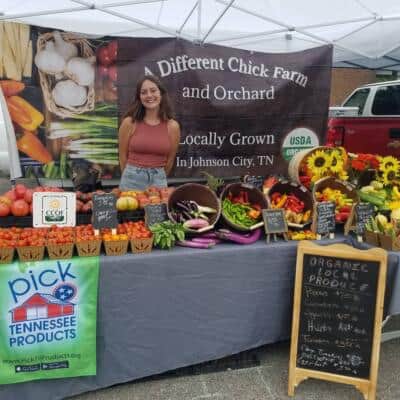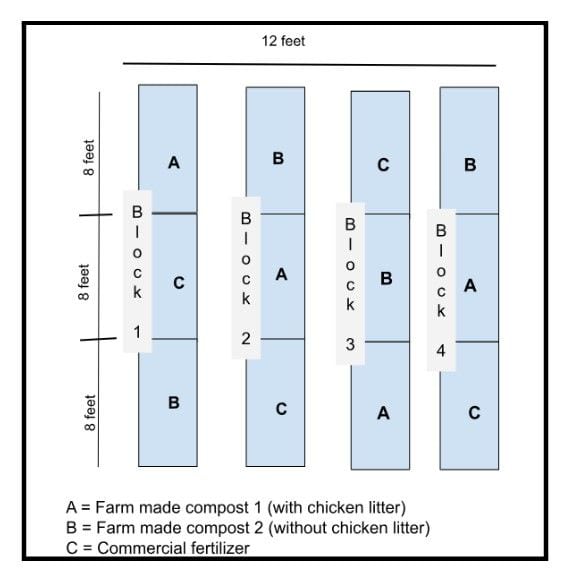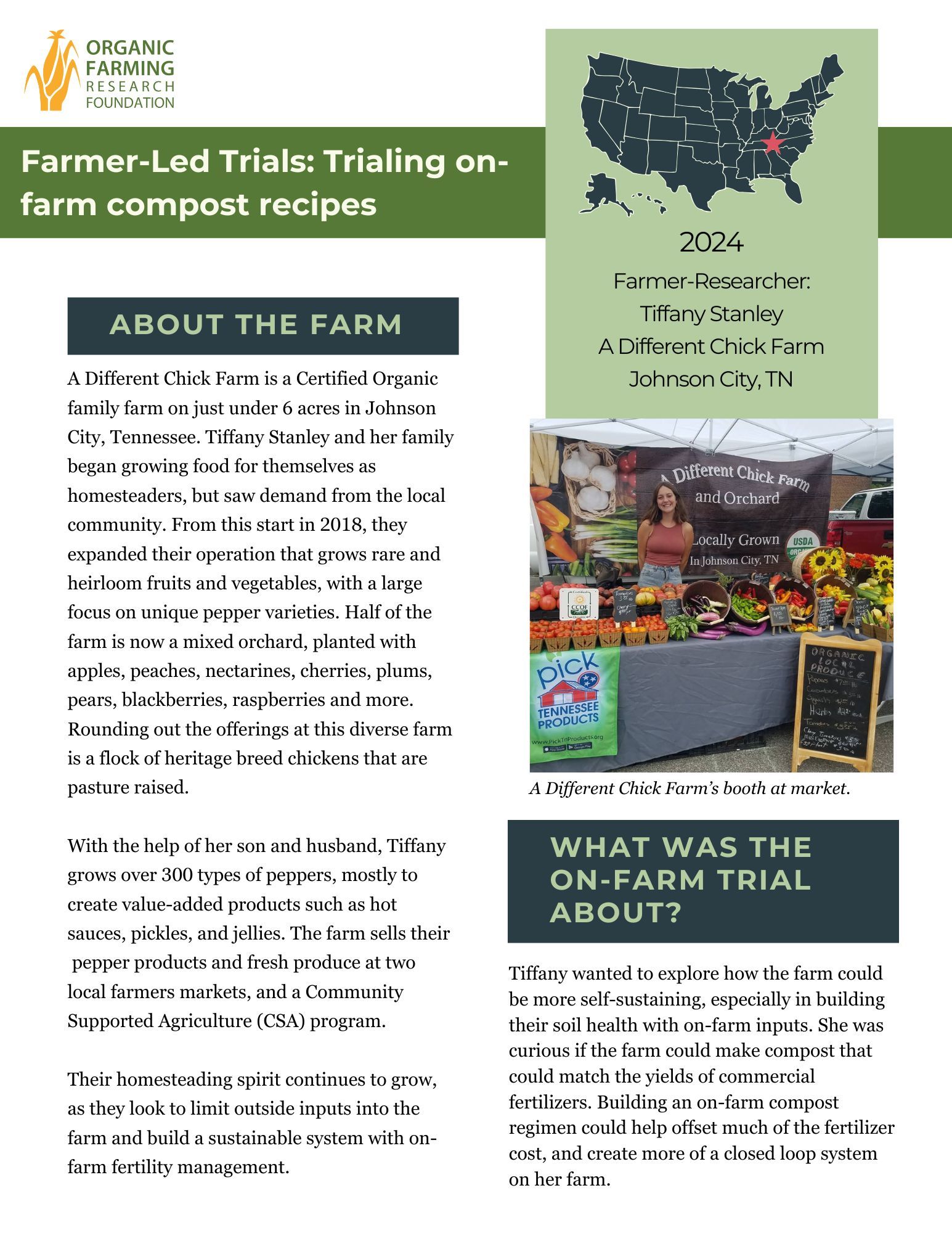Written by Mary Hathaway, OFRF’s Research & Education Program Manager

A Different Chick Farm booth at market.
A Different Chick Farm is a Certified Organic family farm on just under 6 acres in Johnson City, Tennessee. Tiffany Stanley and her family began growing food for themselves as homesteaders, but saw demand from the local community. From this start in 2018, they expanded their operation into an abundant production featuring rare and heirloom fruits and vegetables, with a large focus on unique pepper varieties. Half of the farm is now a mixed orchard, planted with apples, peaches, nectarines, cherries, plums, pears, blackberries, raspberries and more. Rounding out the offerings at this diverse farm is a flock of heritage breed chickens that are pasture-raised.
With the help of her son and husband, Tiffany grows over 300 types of peppers, mostly to create value-added products such as hot sauces, pickles, and jellies. The farm sells their pepper products and fresh produce at two local farmers markets, and a Community Supported Agriculture (CSA) program. Their homesteading spirit continues to grow, as they look to limit outside inputs into the farm and build a sustainable system with on-farm fertility management.
Producing On-Farm Compost to Reduce Inputs
A homesteader at heart, Tiffany wanted to explore how the farm could be more self-sustaining, especially in building their soil health with on-farm inputs. She was curious if the farm could make compost that could match the yields of commercial fertilizers. Building an on-farm compost regimen could help offset much of the fertilizer cost, and decrease the environmental footprint of the farm. There were a few factors that the farm considered: would the composting demand a lot more labor, would yields remain viable? As a family enterprise, there were risks in transitioning from a known and reliable yield from commercial fertilizers to a new and untested compost system.
Farm trial plan
With technical support from OFRF, Tiffany decided to get answers and compare two different on-farm compost recipes with her usual practice of applying Harmony, a granular fertilizer (5-4-3). Tiffany wanted to put her chickens to good use, so one compost recipe she wanted to try included chicken manure as the main nitrogen source for one of her compost formulas. Her second compost recipe in the trial used clover and fresh grass clippings as the main nitrogen source. Both recipes included wood chips as the primary carbon source.
One of her best fall cash crops is cucumbers, so the trial was designed for Socrates cucumber, transplanted out from her greenhouse to be planted in a 12×24 hoophouse in mid-September. At the time of transplanting, Tiffany would apply the different treatments: Compost recipe 1, Compost recipe 2, or the commercial fertilizer, respectively.
In farm trials, it is key to keep things consistent, so Tiffany made sure to count each plant that was transplanted so that each block had the same number of cucumber plants. Once the cucumbers begin to set fruit, she will weigh the yield as well as count the number of cucumbers from each plot. She is hopeful that the results of this trial will help her work towards building her on farm fertility plans, and keep harvests bountiful. Stay tuned for updates on the farm trial outcomes and findings this fall!
“I had a friend that was retired from NRCS tell me about the program and encouraged me to apply. I read many of the farm trials and what the program did to help organic farming and decided it was a wonderful opportunity. I am always looking for a better, more sustainable way to farm and was so excited to get picked for this program.”
– Tiffany Stanley, A Different Chick Farm

Research Results
Tiffany Stanley’s farmer-led trial examined whether the farm could make compost that could match the yields of commercial fertilizers, to support the farm to be more self-sustaining, and build soil health with on-farm inputs.
Key Findings:
-
Lab analysis showed that the green manure recipe had significantly lower nutrient availability than the chicken manure recipe (Figure 2). While this did not translate into statistically significant differences in fruit quantity or yield, differences in plant health and pest susceptibility were observed.
-
Plants grown with chicken manure exhibited robust growth and showed lesser aphid pressure. Plants grown with green manure and fertilizer demonstrated greater susceptibility to aphids, which may have been due to their lower nutrient availability and overall reduced plant health.
While the trial showed no statistically significant difference in cucumber quantity, yield, or average fruit weight between the treatments, Tiffany did notice that the cucumbers grown with chicken manure seemed healthier and more resistant to pest pressure. In the future, she plans to further experiment with her compost recipe, keeping chicken manure in the mix to help achieve her on-farm fertility goals.
For full details on the study’s methodology and results, read the final report.
This story is part of a series profiling farmers who are taking part in OFRF’s Farmer-Led Trials (FLT) program. Farmers receive technical support from OFRF to address their challenges through structured on-farm trials. To learn more about OFRF Farmer-Led Trials Program, visit our website page at https://ofrf.org/research/farmer-led-research-trials/
To learn more about composting and farm fertility programs check out these resources:
- Oregon State University, Small Farms Program, On-Farm Compost- Will It Work On My Farm
- ATTRA/NCAT Toolkit: How to Reduce Synthetic Fertilizer Use
To learn more about A Different Chick Farm, you can find them on Instagram and Facebook or visit their website: https://adifferentchickfarm.com/ or watch a YouTube video they made about their Farmer-Led Trial.



